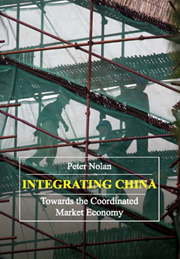Book contents
- Frontmatter
- Contents
- Acknowledgements
- Foreword
- 1 Reflections on 4th June 1989
- 2 The Global Business Revolution and Developing Countries
- 3 The Globalisation Challenge and the Catch-up of Developing Countries: The Case of the Brewing Industry
- 4 The Global Industrial Consolidation and the Challenge for China: The Case of the Steel Industry
- 5 China in the Asian Financial Crisis: ‘Cutting the Trees to Save the Forest’
- 6 China at the Crossroads
- 7 Capitalism and Freedom: The Contradictory Character of Globalisation
- 8 Capitalism, Conflict and Cooperation: US-China Relations under Capitalist Globalisation
- Index
3 - The Globalisation Challenge and the Catch-up of Developing Countries: The Case of the Brewing Industry
Published online by Cambridge University Press: 05 March 2012
- Frontmatter
- Contents
- Acknowledgements
- Foreword
- 1 Reflections on 4th June 1989
- 2 The Global Business Revolution and Developing Countries
- 3 The Globalisation Challenge and the Catch-up of Developing Countries: The Case of the Brewing Industry
- 4 The Global Industrial Consolidation and the Challenge for China: The Case of the Steel Industry
- 5 China in the Asian Financial Crisis: ‘Cutting the Trees to Save the Forest’
- 6 China at the Crossroads
- 7 Capitalism and Freedom: The Contradictory Character of Globalisation
- 8 Capitalism, Conflict and Cooperation: US-China Relations under Capitalist Globalisation
- Index
Summary
Introduction
The role that big businesses perform in the national economy has triggered numerous theoretical interests, which can be broadly categorised into two schools. The mainstream school prefers small and medium-sized enterprises (SMEs) to big businesses because the former in a perfect competition is believed to bring about allocative efficiency, whereas the latter is believed to be more often than not associated with monopoly or oligopoly, and to deviate from allocative efficiency. Big businesses in the form of monopolistic and oligopolistic firms are believed to hinder free competition. According to Marshallians, big businesses will lose their dominant positions in the long run (Marshall, 1920: 315-6).
In contrast, the non-mainstream approach argues that big businesses (often monopoly or oligopoly) could benefit the economy in the long run. The Schumpeterian theorem demonstrates through a process of creative destruction, monopolies or oligopolies are more conducive to growth than perfect competition (Schumpeter, 1976). Scherer (1996) points out that monopolistic or oligopolistic competition exists in a wide array of industries in the United States. Whether or not oligopolies and monopolies cause lower welfare depends on individual industries. Nolan et al. (2002) demonstrate that in the era of the global big business revolution, the number of players in industry after industry has fallen dramatically and global competition among oligopolistic firms has been vastly intensifying. In terms of a giant firm's limit, Edith Penrose (1995) suggests that a firm's size has no theoretical limits because a firm can always expand with the aid of managerial resources and research capabilities.
- Type
- Chapter
- Information
- Integrating ChinaTransition into Global Economy, pp. 43 - 70Publisher: Anthem PressPrint publication year: 2007



